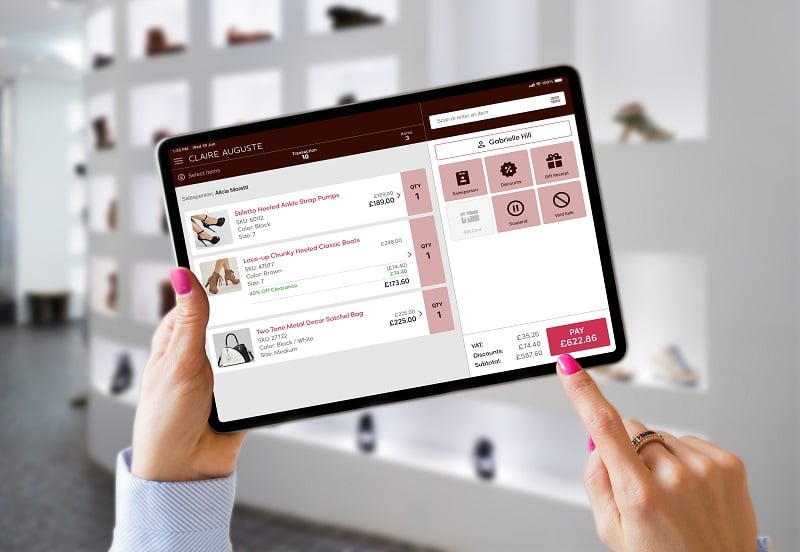Examining the role of store events, Mobile POS in experiential retail
By Dave Bruno, Director of Retail Market Insights, Aptos
Those ‘retail apocalypse’ and ‘the store is dead’ rumours have finally been put to rest. Whilst the cost-of-living crisis has certainly put a strain on the high street in recent years, retail performance is on a path to greater stability in 2024 thanks to moderating inflation and other encouraging economic indicators.
With the confidence that comes from being on firmer financial footing, we are starting to see an uptick in retailers’ investments in their store experiences as well as in IT modernisation. Relatedly, we’ve also seen increased interest in the role of events – both inside and outside the store – to drive traffic, increase conversions and foster deeper customer connections.
According to this research: 91% of consumers reported they would be more inclined to purchase a brand’s product or service after participating in an experience, and 40% felt they became more loyal to the brand.
As you evaluate adding more ‘experiential’ to your retail strategy, here are three things to consider:
- Transform your stores into community hubs.
Oftentimes, purchasing products online is more convenient (hello, Amazon!). But there’s a reason that more than 70% of retail sales still occur in physical stores. People want the familiarity of brick and mortar, the discovery, the sensory enjoyment, the … experience. But not just any experience.
Retail stores are being transformed into dynamic, customer-centric spaces that give shoppers a reason to get off their sofas and come inside.
For instance, Sweaty Betty offers free in-store fitness classes. John Lewis offers a wide variety of in-store events, ranging from beauty workshops to crafting for kids to interior design seminars. And EE’s Experience stores feature carefully curated zones, with each demonstrating how cutting-edge technology and connectivity are enhancing everyday life – from gaming and relaxing to working and learning. At EE Experience stores, shoppers can play the latest video games, catch up on email whilst having a cup of tea, demo new devices and more – all under one roof.
The experiential retail examples cited above are all very different, yet they share a common thread of leveraging community engagement to bring to life the core value propositions of each brand.
- Go where your customers gather.
As shared above, creating memorable experiences within your stores is a brilliant way to engage shoppers and boost sales and loyalty. But what if you flipped that around and actually brought your store to memorable events where your customers are already gathered?
In the US, western wear retailer Boot Barn opens temporary stores co-located at major rodeos. And US-based athletic footwear company New Balance, which also has a strong presence in the UK, launches pop-up shops at fitness events ranging in scope from local youth sports championships to big-city marathons, including the official expo at the London marathon.
By bringing your products directly to consumers who share interests and lifestyles that align with your brand, you can achieve high-volume sales transactions throughout the event’s duration. And perhaps even more lucrative, opening pop-ups at these events provides a significant opportunity for customer acquisition, which could reap rewards for your business for years to come.
- Think mobile-first for point of sale.
Whilst your goal for memorable in-store and beyond-the-store events is to build customer loyalty and differentiate your brand, you obviously want to sell products too. That’s where a mobile-first point of sale solution comes in – such as Aptos ONE POS.
Aptos ONE POS offers robust functionality delivered via mobile interfaces that are easy to use – so easy that most retail associates can be trained on the software in 10 minutes or less. Aptos ONE POS packs the industry’s most powerful cloud-based features set into an intuitive app for iOS or Android devices, enabling associates to connect customers to products anywhere, from the palm of their hand.
And whilst it’s easy to think that cloud connectivity is ubiquitous these days, that’s far from the truth, especially when transacting outside a store’s four walls or for stores frequently impacted by extreme weather outages and those with mysterious ‘dead spots.’ That is why Aptos ONE POS offers patented offline resilience, ensuring associates can continue capturing sales even if they lose a network connection.
To learn how Aptos ONE POS powers memorable and reliable experiences for global retailers, in store and beyond, request a demo. For additional insights on why more retailers are investing in store events and community engagement, you can view Aptos’ recent iPaper, here.














